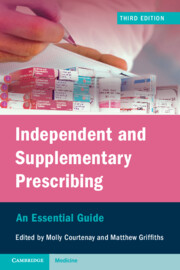Book contents
- Frontmatter
- Contents
- List of Contributors
- Foreword
- Preface
- 1 Non-Medical Prescribing: An Overview
- 2 Non-Medical Prescribing in a Multidisciplinary Team Context
- 3 Consultation Skills and Decision Making
- 4 Legal Aspects of Independent and Supplementary Prescribing
- 5 Ethical Issues in Independent and Supplementary Prescribing
- 6 Psychology and Sociology of Prescribing
- 7 Applied Pharmacology
- 8 Monitoring Skills
- 9 Promoting Concordance in Prescribing Interactions
- 10 Evidence-Based Prescribing
- 11 Extended/Supplementary Prescribing: A Public Health Perspective
- 12 Calculation Skills
- 13 Prescribing in Practice: How It Works
- 14 Minimising the Risk of Prescribing Error
- 15 Education and Training to Become a Prescriber
- 16 Antimicrobial Prescribing
- Index
5 - Ethical Issues in Independent and Supplementary Prescribing
Published online by Cambridge University Press: 23 December 2021
- Frontmatter
- Contents
- List of Contributors
- Foreword
- Preface
- 1 Non-Medical Prescribing: An Overview
- 2 Non-Medical Prescribing in a Multidisciplinary Team Context
- 3 Consultation Skills and Decision Making
- 4 Legal Aspects of Independent and Supplementary Prescribing
- 5 Ethical Issues in Independent and Supplementary Prescribing
- 6 Psychology and Sociology of Prescribing
- 7 Applied Pharmacology
- 8 Monitoring Skills
- 9 Promoting Concordance in Prescribing Interactions
- 10 Evidence-Based Prescribing
- 11 Extended/Supplementary Prescribing: A Public Health Perspective
- 12 Calculation Skills
- 13 Prescribing in Practice: How It Works
- 14 Minimising the Risk of Prescribing Error
- 15 Education and Training to Become a Prescriber
- 16 Antimicrobial Prescribing
- Index
Summary
The authority to prescribe raises a range of important ethical concerns. This chapter provides an account of the ethical issues in independent and supplementary prescribing with an overview of ethical frameworks, medical and non-medical prescribers. The core of ethical considerations of prescribing is the imbalance of power between the prescriber and patient where there is the potential for abuse and the power to control. As such, links to governing bodies are included with specific relationships between ethics and codes to remind practitioners that objective external standards are necessary to ensure they have a frame of reference against which to judge their actions
Information
- Type
- Chapter
- Information
- Independent and Supplementary PrescribingAn Essential Guide, pp. 50 - 65Publisher: Cambridge University PressPrint publication year: 2022
